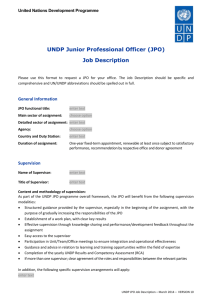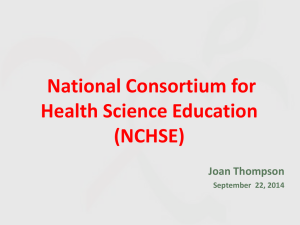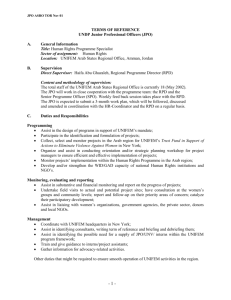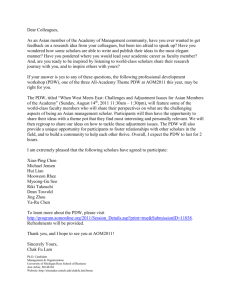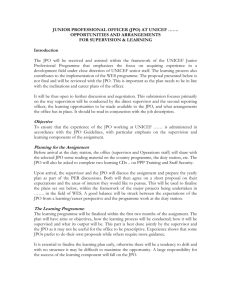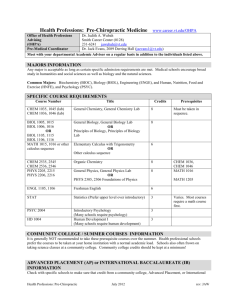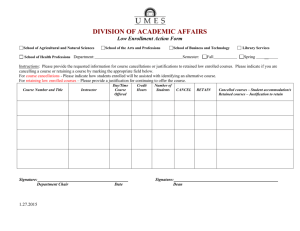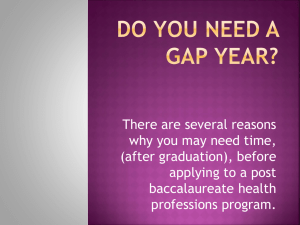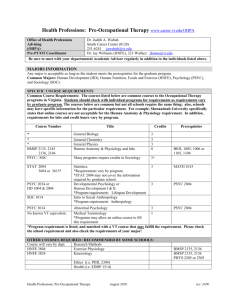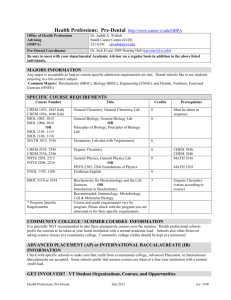Submission 10527 Title Page Submission number 10527 Title of the
advertisement
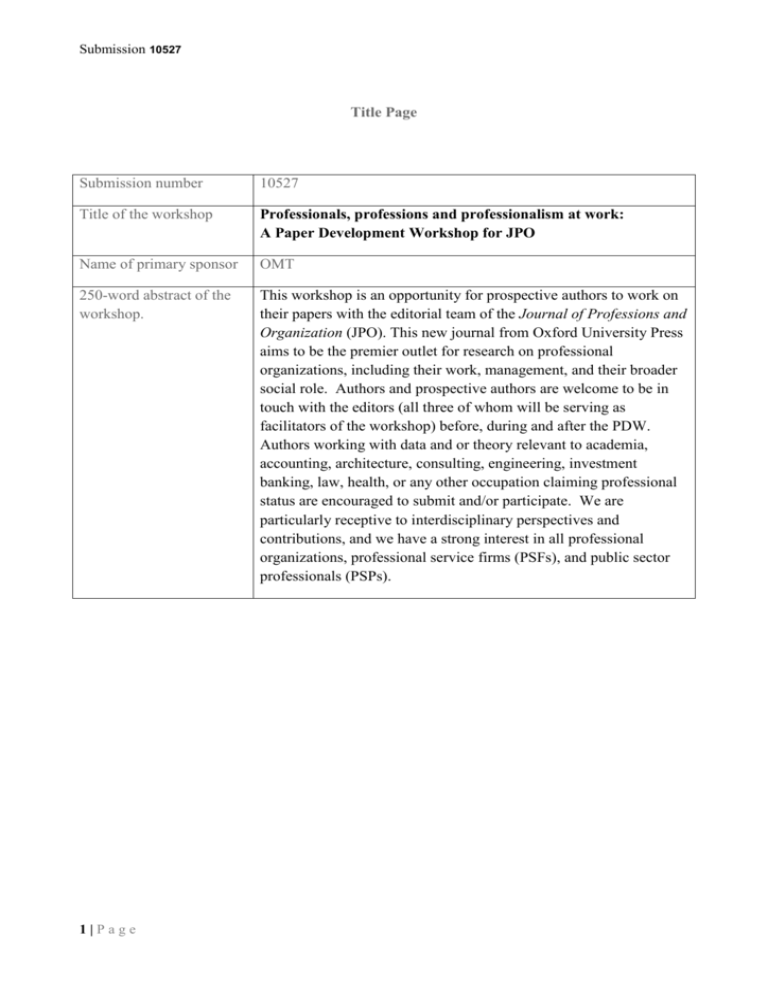
Submission 10527 Title Page Submission number 10527 Title of the workshop Professionals, professions and professionalism at work: A Paper Development Workshop for JPO Name of primary sponsor OMT 250-word abstract of the workshop. This workshop is an opportunity for prospective authors to work on their papers with the editorial team of the Journal of Professions and Organization (JPO). This new journal from Oxford University Press aims to be the premier outlet for research on professional organizations, including their work, management, and their broader social role. Authors and prospective authors are welcome to be in touch with the editors (all three of whom will be serving as facilitators of the workshop) before, during and after the PDW. Authors working with data and or theory relevant to academia, accounting, architecture, consulting, engineering, investment banking, law, health, or any other occupation claiming professional status are encouraged to submit and/or participate. We are particularly receptive to interdisciplinary perspectives and contributions, and we have a strong interest in all professional organizations, professional service firms (PSFs), and public sector professionals (PSPs). 1|Page Submission 10527 Professionals, professions and professionalism at work: A Paper Development Workshop for JPO a. Overview There is a growing awareness of the critical role that professions play in advanced economies. Professionals and professional service firms are key advisors, analysts, defenders and developers of the major institutions that underpin capitalist economies (Brint, 1994; Brock, Powell & Hinings, 1999). As gatekeepers to key financial institutions, the professions influence both the success and failure of capital markets (Coffee, 2006; Nicolai, Schultz & Thomas, 2010). Professional service firms are also powerful economic actors in their own right, contributing over 3 trillion (USD) to the global economy (Riddle, 2002). Professions influence more than the market system, however. They are also key agents of social change. As Scott (2008: 219) observes, “the professions in modern society have assumed leading roles in the creation and tending of institutions. They are the preeminent institutional agents of our time.” Professions are institutions that have experienced profound changes. Professional organizations are increasingly adopting both the logic (Faulconbridge & Muzio, 2009; Leicht & Fennel, 2008) and structures (Cooper et al, 1996; Brock et al, 1999; 2007) of business corporations. Professional identities are increasingly framed around logics of efficiency and commerce (Anderson-Gough, Grey & Robson, 1998; Goodrick & Reay, 2010) which have displaced traditional logics of ethics (Brint, 1994; Suddaby, Gendron & Lam, 2009). Professional firms now tend to be multidisciplinary (Suddaby & Greenwood, 2005) and transnational (Suddaby, Cooper & Greenwood, 2007; Brock, Yaffe & Dembovsky, 2006); a development which is eroding the value of traditional self-regulatory regimes (Clementi, 2004) and making the professional service firm the primary site of professional control and regulation (Cooper & Robson, 2006). 2|Page Submission 10527 Until now, all the above discourse has taken place across a range or managerial, organizational, sociological and disciplinary journals. However, beginning in 2013, the Journal of Professions and Organization (JPO) will provide a single home for scholars interested in the interface between professional sand the organizations in which they work. JPO aims to be the premier outlet for research on professional organizations, including their work, management and their broader social and economic role. Whereas the focus will be on the organizational level, we maintain a broad interest in professionals, the professions, professionalization, professional practice and relevant work-place issues. We are particularly receptive to interdisciplinary perspectives and contributions, with strong interests in all professional organizations, professional service firms (PSFs), and public sector professionals (PSPs). While recognizing the importance of traditional professions, we welcome work on new professions, occupations claiming some professional status, and on knowledge workers more generally. JPO will be a catalyst for top quality scholarly research concerning professionals and their organizations. We aim to connect to a number of important theoretical as well as organizational and managerial developments which are emerging in this field. Current theoretical advances are building on institutional theory, and the sociology of organizations and markets. This journal will be a leading venue for these theoretical advances as they apply to professional organizations, PSFs and PSPs. Further, there will be a strong emphasis on developments in managerial practices and organizational forms relevant to these contexts. Another objective is concerned with better understanding the crucial role of professional organizations and occupations in the wider economic and social order. A critical objective of JPO is to leverage the network of international scholars in sociology, management, psychology, geography as well as economics and business history in order to advance research in the broader field of expert or knowledge-based work. This broad perspective will enable us to bring together scholars from very diverse disciplines to allow 3|Page Submission 10527 us to engage in broad debates and foster a multidisciplinary research agenda. This makes JPO quite unique and puts it at the forefront of the development towards more integrative and multidisciplinary research in this specialty field. This PDW will be an opportunity for prospective authors to learn more about JPO and explore the suitability of their research for this outlet. All three editors of JPO will be in attendance. Authors will be invited to send any ideas, formative drafts, or manuscripts to the editors ahead of the PDW; or to bring their work along with them. [Format of the PDW is outlined later in this proposal.] We will circulate additional information once the JPO website is up and running, but until then prospective authors are welcome to contact the editors, David Brock (dmb@bgu.ac.il), Hüseyin Leblebici, (hleblebi@illinois.edu) and Daniel Muzio (daniel.muzio@mbs.ac.uk). JPO’s scope Taking stock of the theoretical fragmentation of this field and with the realization that existing models may no longer fit the changing, more complex and uncertain social, economic, and cultural environment in which the professions operate, JPO will publish a breadth of papers that contribute both theoretically and empirically to our understanding of contemporary professional organizations, their work and management. Prior analyses seem to indicate three levels of analysis within which empirical and theoretical advances are called for, namely: ● the micro/workplace level: concerning issues such as working conditions and practices; ● the meso/organizational level: concerning issues such as management and organization of PSFs and PSPs; and, ● the macro/institutional level: concerning issues such as broader changes in the field of professionals, as well as regulation and their changing social role. We thus encourage submissions which explore, but are not limited to, questions such as: 4|Page Submission 10527 ● What new managerial practices, strategies, organizational structures and business models are evolving? ● What have we learned about the management and organization of professionals that may lead to better normative understandings of effective managerial techniques in the contemporary context? ● What are the prospects for new ownership structures? What impact are these likely to have on work practices and cultures? What types of firms are most likely to pursue these? ● What is the likely impact of new organizational models for the working conditions and experiences of professionals? ● What changes are underway concerning the broader social function of professional organizations? ● How are professions and professional organizations reshaping core political, economic and social institutions? ● What theoretical and conceptual lenses can we use to make sense of such developments? ● To what extent can professional organizations be studied using concepts derived from mainstream organizational theory (N-form, boundaryless organization, virtual corporation, the adhocracy) and in what ways should these be developed to apply to professional firms? ● Existing models of PSFs tend to be Anglo-centric in focus and to reflect the experiences of a few show case professions (law or accountancy), how relevant are these for understanding PSFs in other national and occupational contexts? JPO will publish papers of various methodologies and approaches: conceptual, theory building, meta-analytical, and empirical. Recognizing the multi-disciplinary character of this area, submissions may draw on history, geography, political theory, sociology, economics and 5|Page Submission 10527 management thinking. Given the extremely fluid state of the field, we are also keen to consider speculative and thinking pieces. b. Relevance of this PDW to OMT The objectives of this PDW are very much in line with the stated domain of the OMT division, namely to promote theoretical development and empirical testing of organization–level research in what is a particularly significant and topical context. Furthermore, similar to OMT’s mission statement, this PDW will contribute to the development of the community of researchers, educators, and practitioners who advance OMT scholarship within the domain of professions, professional organizations, and professional projects. c. Workshop format The PDW will run for two hours. We will begin with brief introductions of all present, during which participants will be asked to try to give a one-minute overview of their “professional organization” research. This initial phase should take about half an hour. Then for about the next hour, we will split into groups to discuss specific papers and ideas submitted by attendees. Depending on the number of papers/drafts/proposals send in advance to the editorial team, further members of the editorial board will be invited to help provide personal attention to attendees as far as possible. For the final half-hour we will gather together again in the spirit of sharing new insights. The editors will briefly sketch the way forward for JPO, and arrangements will be make for all participants to keep in touch in the future. To make our sessions as productive as it can be we will request participants to submit their papers in advance of the workshop. 6|Page
